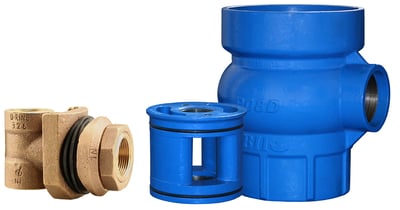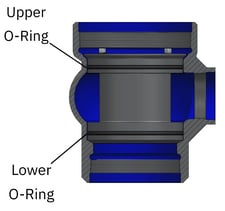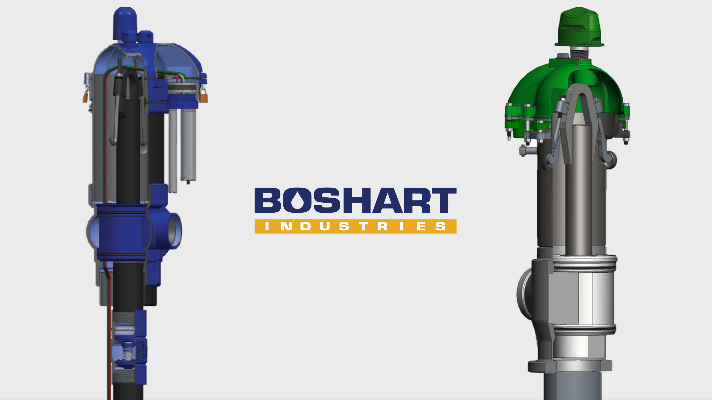The term pitless adapter covers a wide range of brands and designs developed for the same purpose in the Water Well Industry. There are many different types of pitless adapters which look and install very differently but they serve the same basic purpose.
In this blog, we will be covering the two most commonly used types of pitless adapters; a slide type pitless and a spool type pitless. Our goal is to provide an understanding of exactly what they are, what the differences are and what they do. Let's get started.
Why the Term "Pitless"?
The term "pitless" comes from the fact that pitless adapters eliminate the need for a "Well Pit". Without the need for a pit, the adapter is appropriately named a Pit-less adapter.
Prior to the development of pitless adapters, well pits were required to allow the installer to manually assemble or dissemble the union fittings which connect the drop pipe to the supply pipe down inside the well pit, below the frost line. The old well pit system has been replaced by pitless adapters which eliminates unsanitary and dangerous well pits. Pitless adapters are sanitary and provide a fast and easy quick connection below the frost line.
Pitless Adapters in General
The general purpose of a pitless adapter is to provide a water tight, 90° connection below the frost line. They provide a quick connect assembly, creating a connection between the drop pipe (riser pipe) from the submersible pump to the well head, making a 90° change in flow direction and discharged through the service line to the water storage tank.
As you can see from the picture, these two types of pitless adapters look nothing a like. The slide pitless is on the left and the spool type pitless is on the right.
Slide Pitless Adapter
.png?width=250&name=Pitless%20Adapter(1).png) Slide type pitless adapters are very popular and are mainly used in residential and commercial applications up to 2" drop pipe sizes. The slide pitless is installed through a hole drilled in the well casing. A water tight sanitary seal is made using compression gaskets on both the inside and the outside of the well casing.
Slide type pitless adapters are very popular and are mainly used in residential and commercial applications up to 2" drop pipe sizes. The slide pitless is installed through a hole drilled in the well casing. A water tight sanitary seal is made using compression gaskets on both the inside and the outside of the well casing.
The slide pitless adapter allows for easy installation or removal of the submersible pump by lifting the pitless elbow using the pull pipe. A single o-ring makes a compression seal between the two mating parts ensuring a leak free connection.
The most common application for slide pitless adapters is for submersible pumps. They are also sometimes used to install the drop pipe and foot valve in shallow well jet pump systems.
Spool Pitless Adapter
.png?width=250&name=My%20Post(172).png) The picture on the right shows an example of a spool pitless adapter
The picture on the right shows an example of a spool pitless adapter consisting of two components, the spool and the discharge housing. On the left is an example of a complete pitless unit. As you can see in the picture, the spool pitless adapter is installed between the well casing and the upper barrel. The upper barrel is typically 2" larger than the well casing. A well cap provides a sanitary seal for the well. When all the components are assembled together, it becomes a pitless unit.
consisting of two components, the spool and the discharge housing. On the left is an example of a complete pitless unit. As you can see in the picture, the spool pitless adapter is installed between the well casing and the upper barrel. The upper barrel is typically 2" larger than the well casing. A well cap provides a sanitary seal for the well. When all the components are assembled together, it becomes a pitless unit.
Spool pitless adapters and pitless units allow for easy installation or removal of the submersible pump by lowering or lifting the pitless spool and pipe column using a lift out/hold down assembly. The sealing method differs from slide type pitless as two o-rings make a compression seal between the spools circumference and precision machine seats in the discharge housing.
Spool type pitless' are a "Clear Way" design, meaning there is no obstruction through the pitless providing access to the full well case diameter for well rehabilitation or cleaning. Therefore, they meet the requirements of all well construction codes. Be sure to check with your local jurisdiction to ensure the adapter you are using complies with your local codes.
To sum it up, slide pitless and spool pitless adapters are similar when it comes to their purpose but different in the design and application. Both are an important components to move water from the source to the service location.
Checking with your local codes will guarantee you are using the correct adapter, and will save you from selecting the wrong one.
Have further questions about this subject?

Head over to Boshart's Knowledge Base: technical product information, guidelines, and more.


.png)


SHARE